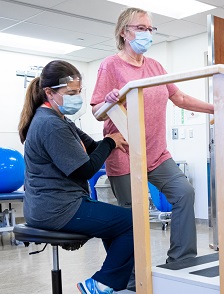Patient declaration of values

Quick Links
Contact Us
Bridgepoint’s Patient Declaration of Values was developed through widespread consultation with our patients, former patients, family members and informal caregivers. This public consultation was also in accordance with Ontario’s Excellent Care for All Act in order to ensure patients’ needs and values are well considered throughout their care journey.
Our Patient Declaration of Values reflects what our patients and community want and expect from our hospital team. Patients at Bridgepoint value:
Voice/Communication
- Having a means of expressing their opinions, positive or negative, about their health care experience without fear of reprisal
- Having health care providers who actively listen to patient concerns
- Being able to communicate directly with providers
- Having access to translation services to aid in communication
- Having the necessary supports to assist with communication (e.g., translation, augmentative and alternative communication)
- Knowing that they can take issues to Patient Relations
- Knowing that communication regarding key patient care issues occurs between health care providers
Being Informed
- Receiving timely, accurate and complete health information (including options) to support informed decision making and active participation in care
- Being spoken to in a way the patient can understand
- Having handouts written at a level patient’s can understand, avoiding jargon
- Being spoken to directly by the appropriate health care provider
Engagement and Participation
- Actively participating in goal setting
- Actively participating in all aspects of their health care to the best of their ability and interest
Giving Consent
- Having information provided in writing, where possible
- Giving/refusing consent for treatment and activities of daily living
- Knowing that consent is a process
- Having sufficient opportunity to ask questions, and reflect upon decisions
- Having revisions to treatment plan discussed
- Having capable decisions respected
Quality Care
- Receiving high-quality, compassionate, evidence-based care and services
- Having continuity in care providers, where possible
- Knowing that health care providers are up-to-date on training and education
- Having health care providers who understand the patient story
- Receiving fair and equitable treatment, balancing the competing needs of patients
- Receiving care in a clean environment
Courtesy and Respect
- Being treated with courtesy, patience and respect, including respect for cultural diversity
- Having requests acknowledged
- Having follow through on requests
- Knowing that personal dignity will be respected
- Having symptoms including pain respected as genuine
Confidentiality
- Knowing that personal, medical and financial information is kept in confidence
- Being asked personal questions in a quiet manner (inside voice) so as to minimize others hearing
Privacy
- Being provided with as much privacy as possible especially during care and procedures
- Knowing that staff recognize closed bed curtains as a signal of privacy, and announce themselves before entering
Independence
- Being encouraged and supported in achieving the maximum possible level of independence
- Knowing that support is available as needed
- Being challenged to achieve that which you are capable, while recognizing limitations
Social and Other Practices
- Being aware of and able to pursue social, cultural, recreational, and spiritual practices
- Being encouraged & supported by other patients
- Having other patients respect their needs/boundaries





